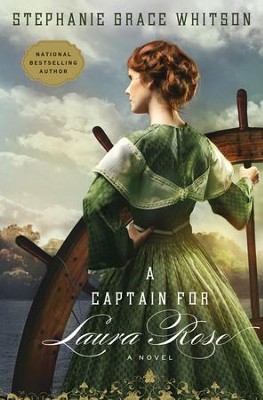 Stephanie Grace Whitson's post Civil War novel follows a young woman who, due to a series of tragic events, becomes captain and pilot of her own steamboat. Regardless of how skilled she may be, however, females were not given pilot licenses, so Laura White must find a co-pilot willing to share the wheel with a woman. Unfortunately, thanks to her sex and her ship's reputation for bad luck, the only taker appears to be her brother's old friend, who bears an established reputation as a wild young drunk. Lest her reputation end up in tatters, Laura is also stuck with Finn's two sisters on board - one a starchy spinster, the other a high-spirited young flirt. Can Laura travel the length of the river and back again in time to pay off debts on the boat, or, assuming the Laura Rose survives the perilous journey north and back again, will she lose the only home she has ever known?
Stephanie Grace Whitson's post Civil War novel follows a young woman who, due to a series of tragic events, becomes captain and pilot of her own steamboat. Regardless of how skilled she may be, however, females were not given pilot licenses, so Laura White must find a co-pilot willing to share the wheel with a woman. Unfortunately, thanks to her sex and her ship's reputation for bad luck, the only taker appears to be her brother's old friend, who bears an established reputation as a wild young drunk. Lest her reputation end up in tatters, Laura is also stuck with Finn's two sisters on board - one a starchy spinster, the other a high-spirited young flirt. Can Laura travel the length of the river and back again in time to pay off debts on the boat, or, assuming the Laura Rose survives the perilous journey north and back again, will she lose the only home she has ever known?While Laura and Finn are the main characters, it is almost as much the story of Finn's sisters, Fiona and Adele. Watching their personal journeys as they travel up the river and down again added more depth to the story - both have plenty room for growth, and they do not disappoint. The first time Adele's point of view was introduced, my instant impression was "that manipulative little minx," but as she matures, she improves. She will never be like straight-laced Fiona, but we are all different parts of the body of Christ.
It was fun to learn about steamships and the hazards they faced as they traveled up and down the Mississippi /Missouri. While it makes sense, I never supposed that pilots needed licensing even back then, lest no one trust them to take their cargo. As the author's note points out, some of the stranger details and sights seen are taken directly from history and not the product of an overactive imagination - a case of fact often being stranger than fiction.
Though not expressed as such in the novel, there is a definite theme of second chances running through the story. Laura gets a second chance on paying back the loan, while Adele and Fiona have second chances at relationships (with each other and otherwise). Finn, perhaps, receives the most grace - after a dissolute youth, with occasional lapses even after giving up drinking, the Whites are willing to take a chance on him again. This is not to say that second chances are easily given or that it is easy to trust after giving that second chance, but it is a good reminder of how many second, third, and even fiftieth chances God, in His grace, gives us. How can we refuse them to others?
Whitson does a good job showing just how hard the journey (physically, emotionally, and spiritually) was for her characters, yet giving credit where it was due to God bringing good out of the tragedy. As Laura learns, one cannot live off someone else's faith - at some point a personal decision must be made. Whitson creates an enjoyable read with a fine balance of historical detail, spiritual growth, and romance.
No comments:
Post a Comment